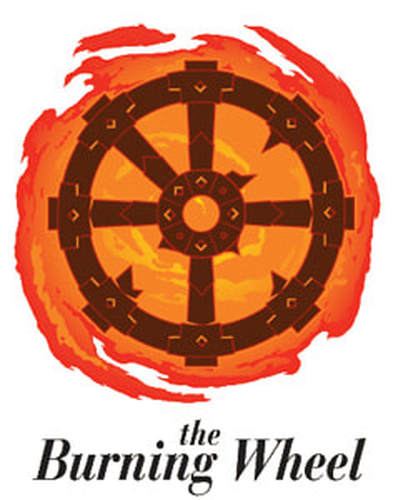 After umpteen years telling stories through the vaunted medium of roleplaying games, I rarely come across a mechanic or system that surprises me. More often, I’ll find something that differs just slightly from normal procedure, or a simplified version of another system. Burning Wheel, however, made me reconsider the way I run and play tabletop games. While the system is certainly not without its flaws, the changes it makes to the typical gaming experience place this one firmly in my favorites column. 1) Character Burning, Not Creation Other games have a lifepath system that helps you grow your character from a young age to their starting position. Burning Wheel sends you on a journey of discovery, not only of your own character, but of the setting you’ll be playing in. All players, the GM included, discuss what style of fantasy game will grace the table. Dashing privateers seeking a pathway to an uncharted island? Upjumped nobles looking to calm an agitated public on the edge of revolt? A dwarf and his comrades seeking ancient treasure? There’s a setting for you. In my most recent game, I found myself in the position of Captain of a vessel he does not own, while other characters were built as summoner/navigator, company inspector, and the ship’s doctor. Each of us chose lifepaths that placed us in our desired roles, added up the skill and traits we received from our journey, and through in some personalization through freebie points. After the mechanics were crunched, the true work began. We worked together to define the intricacies of the setting, the depths of our characters’ motivations, and the personalities that would clash aboard the vessel. These became our Beliefs and Instincts. 2) Play For Points Burning Wheel is not necessarily a cooperative game of pure storytelling. You are your character’s advocate, even as you inhabit them. When you want to add dice to a roll, you’re expected to make the case for your other skills and how they might factor into a specific skill roll. Players also fight for their Beliefs and try to find ways their Instincts will get into trouble. Why? Satisfaction, of course, but also, the player earns points they can spend by accomplishing goals and furthering the plot. Our merry band of “not-pirates” tried at every turn to use the others to earn Fate, Persona, and eventually, Deeds points. Each has their own separate uses within the game mechanics, but all are invaluable and serve also as a metric for how successful your character is. My melodramatic captain wants to explore something new (as it’s one of his core Beliefs), so when he gets the opportunity to sidetrack from the main mission, he’s going to take it. However, our navigator just wants to get the cargo back to his people, so he’s more motivated to keep us on track so he can get his points. This leads, somewhat organically, to a confrontation between the two characters, whereby each must decide how much of their true motives they wish to reveal in their arguments. Who will come out on top and get those sweet points? The dice and good roleplaying shall decide! 3) Emotional Attributes In addition to a character’s skills, traits, Beliefs and Instincts, some characters will have powerful Emotional Attributes. These are the sole province of non-humans and human characters imbued with Faith. Elves are driven by their Grief, as their eternal lives weigh heavily on them. Dwarves have their Greed, and become more miserly as they witness a world filled with physical and metaphysical things they desire. Orcs are filled with Hate, something they strive against until it finally consumes them. One of our other characters (different campaign) took the Faithful trait, which gives him access to the Faith attribute. With it, he can perform miracles and receive divine guidance. However, should his Faith ever reach 10, he ascends and leaves the mortal plane forever. Each of the Emotional Attributes has a similar character ending condition, colored by the stat in question. While powerful, these attributes are primarily meant to change the way you play the game, factoring into your decision making at each juncture. Our faithful character also took the Chosen One trait, making his Faith tests even easier, while simultaneously drawing the ire of other religious sects directly upon him. There are plenty of other noteworthy aspects to the Burning Wheel, but the above three caused me to pause and truly thing about the way I run games and roleplay characters. How do we most effectively inhabit our character’s skin while championing their causes? How does a group define a setting while adhering to concrete rules? These questions and more are answered by experiencing just the basics of this innovative system. David Horwitz is a gamer and freelance writer/editor with an obsession for exploring new forms of leisure. If you’re looking for an inquisitive mind and a deft hand, or just want to chat about gaming, contact him at www.davidhorwitzwrites.com/contact Picture Reference: http://www.mouseguard.net/book/swords-strongholds-boardgame/ |
All blog materials created and developed by the staff here at High Level Games Archives
April 2023
Categories
All
|
Proudly powered by Weebly

 RSS Feed
RSS Feed